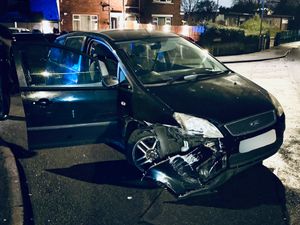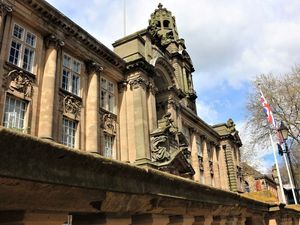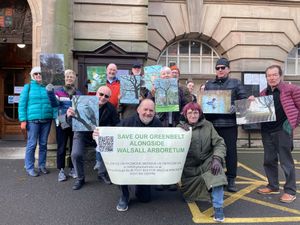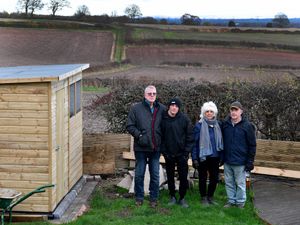'We won't be spared and will go bravely into the unknown': Holocaust survivor tells his story to Aldridge students
"We too won't be spared and will go bravely into the unknown with the hope that we shall yet see you again when God wills."
These are the chilling and heartbreaking words discovered by Holocaust survivor John Fieldsend in a letter from his parents who both died at Auschwitz during the Second World War.
He was just seven-years-old when he was forced to say farewell to them and escape from Czechoslovakia to England as part of a rescue mission to save hundreds of Jewish children in the lead up to the war.
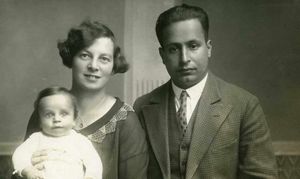
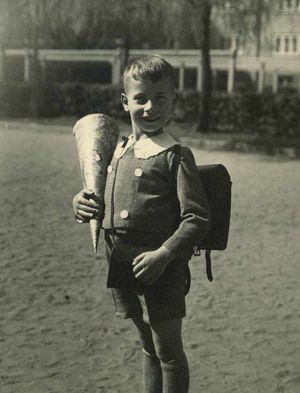
Born into a Jewish family in Czechoslovakia during 1931, Mr Fieldsend and his then 10-year-old brother Gert left behind their mother Trude and father Curt and travelled to England by Kindertransport, via train and boat, in 1939 to be fostered by two separate families.
The German-Czech family, had fled to Czechoslovakia from Germany in 1937 to escape anti-Jewish persecution, only to find themselves again under threat.
The 84-year-old, who was born Hans Heinrich Feige, told his story to 230, year nine students at Aldridge School last week as part of a visit organised by the Holocaust Educational Trust on Wednesday - the 70th anniversary of the liberation of the Bergen Belsen concentration camp.
The retired Anglican vicar, who converted from Judaism as a young man, was given a wristwatch by his mother before boarding the train and setting off for his final destination of Sheffield, where he was fostered by Leslie Cumpsty, a colliery manager, and his wife, Vera.
His brother was fostered by a different family.
Mr Fieldsend, who now lives in Thame, near Oxford, and regularly gives talks to schoolchildren, said: "We were split up but near each other in different parts of Sheffield. I still saw him quite a lot.
"It was a bit scary at the time. I was only seven."
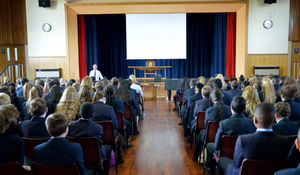
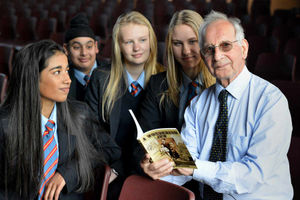
For a short while, he was able to keep in contact with his parents through letters with a limited word count.
He was a teenager when a package arrived in 1946.
Someone had discovered a collection of photograph albums in his grandparents' house in Czechoslovakia, and asked the International Red Cross to find the rightful owner.
Inside one album, in a letter his mother had written: "Dear Boys. When you receive this letter the war will be over. We want to say farewell to you who were our dearest possession in the world."
She added that in December 1942 'it will be our turn, and the time has therefore come for us to turn to you again and to ask you to become good men and think of the years we were happy together. We are going into the unknown'.
His father had also written: "We too won't be spared and will go bravely into the unknown with the hope that we shall yet see you again when God wills. Don't forget us and be good. I too thank all the good people who have accepted you so nobly."
After the war, Mr Fieldsend remained with his foster family, moving with them around the UK.
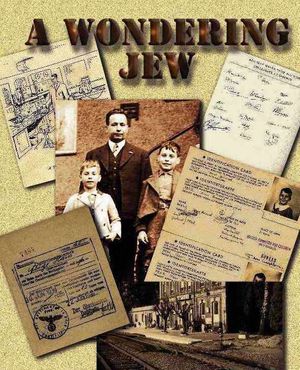
"As children, we just wanted to get on with life," he said.
"We ended up moving to Wakefield."
Through researching records much later on in his life, he discovered his parents died at Auschwitz concentration camp in Poland, he believes in gas chambers. (He said records didn't say when)
The grandfather-of-seven, who married his wife Elizabeth in 1961, said: "I think it's important that the younger generation learns first hand about what happened.
"I do talks about twice a month in schools in the Midlands and the south of England. I've spoken to around 15,000 children in the past eight years.
"The children at Aldridge School were super. They were so quiet when I was talking but then so animated with their questions."
Mr Fieldsend published his autobiography, A Wondering Jew, last year.
Beth Larkin, head of key stage four religious studies at Aldridge School, who helped to organise the visit, said: "The kids have been really engaged and inspired.
"To be able to hear a first hand testimony is invaluable. We want them to learn lessons from the Holocaust."
More than 600 children were saved by the Kindertransport rescue effort, which had been organised by British humanitarian Sir Nicholas Winton.
The former stockbroker abandoned a planned holiday to answer a call for help from a friend in Czechoslovakia engaged in saving Jews from the Nazis.
He worked in Prague, helping to prepare children for evacuation to Britain before returning to London to organise their resettlement.
Founded by Lord Janner of Braunstone and the late Lord Merlyn Rees in 1988, the Holocaust Educational Trust was formed as a result of renewed interest and need for knowledge about the Holocaust during the passage of the War Crimes Act 1991.
It aims is to raise awareness and understanding in schools and amongst the wider public of the Holocaust and its relevance today.
One of the Trust's first achievements was to ensure that the Holocaust was included in the National Curriculum for England in 1991 for key stage three students.
Holocaust has remained on the National Curriculum since then.
Since 1999, the Trust has given thousands of post-16 students and teachers the opportunity to visit the Nazi concentration and death camp Auschwitz-Birkenau as part of a four-part educational programme.
Karen Pollock, chief executive of the Holocaust Educational Trust, added: "The Holocaust Educational Trust educates and engages students from across the UK, from all communities about the Holocaust and there can be no better way than through the first-hand testimony of a survivor.
"John's story is one of tremendous courage during horrific circumstances and by hearing his testimony, students will have the opportunity to learn where prejudice and racism can ultimately lead.
"At the Trust, we impart the history of the Holocaust to young people, to ensure that we honour the memory of those whose lives were lost and take forward the lessons taught by those who survived."

